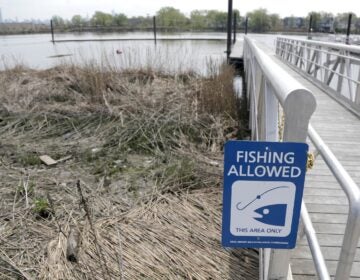Fixing New Jersey’s property taxes: Christie’s plan compared to Lou Greenwald’s
Governor Christie likes to play the character of Jersey tough guy anytime there’s a camera around or when shooting a YouTube video. But when it comes to a real substantive debate, like the one Assembly Majority Leader Lou Greenwald wants to have on their competing tax proposals, Christie seems to run swiftly for the exit, stage far right.
This is commentary from political blogger and cartoonist Rob Tornoe.
Governor Christie likes to play the character of Jersey tough guy anytime there’s a camera around or when shooting a YouTube video. But when it comes to a real substantive debate, like the one Assembly Majority Leader Lou Greenwald wants to have on their competing tax proposals, Christie seems to run swiftly for the exit, stage far right.
Greenwald’s plan is an attempt to fix the biggest problem facing property owners in New Jersey — our abusively high property taxes, which cost the average homeowner $7,759 a year. In his plan, homeowners earning less than $250,000 a year would receive a 20 percent credit of their property taxes, applied against their income taxes. For seniors, the credit would be 25 percent.
The editorial board of the Philadelphia Inquirer likes Greenwald’s plan, as do I. But the plan put forward by reverse Robin Hood Christie does nothing to lower property taxes, instead opting to cut income taxes 10 percent across the board, a move that overwhelmingly favors New Jersey’s wealthiest residents.
Obviously, Christie is working hard to shine his conservative street cred badge in order to impress Joe Scarborough and everyone who watches Fox News. Tax cuts for the rich have long been a staple of conservative “trickle down” economic policies, and have done little over the last 30 years but take money out of the middle class and park it with the rich (while helping to bankrupt state and federal budgets).
His main opposition to Greenwald’s plan is that it’s funded by a millionaire’s tax that would affect 16,000 of New Jersey’s wealthiest residents about the same way a fly affects your enjoyment of the beach. It would only increase the rate on income over $1 million from 8.97 percent to 10.75 percent, so someone making, say, $1.5 million dollars a year would pay about $9,000 more in taxes.
Under Christie’s plan, that same person would save over $7,300 a year, at a cost to Trenton of $1.15 billion.
And if his goal is to help lower property taxes, he doesn’t seem to be in too much of a rush to stop Trenton from robbing local municipalities of an energy tax paid by utility companies that string cables across the land. It’s not chump change — now totaling more than $3.4 billion over the past 10 years. In 2012 alone, utilities will pay $1.1 billion in energy taxes, all of which is supposed to get passed on to towns to help pay teachers, police and firefighters, as well as fund services as mundane as trash collection and filling potholes.
It was Ronald Reagan who famously asked, “are you better off now than you were four years ago?” I can give Christie credit for attempting to fix the problem by capping property tax hikes and working to reform public employee pensions and benefits. But a look at the facts shows in terms of property taxes, New Jerseyans were better off with Jon Corzine as governor.
In 2011, the average New Jersey homeowner paid $7,519 in net property taxes, compared with $6,244 in 2009. That’s a 20 percent increase. To put it another way, last year the average household paid 12 percent of its annual income in property taxes. By the end of the Corzine years, that figure was never more than 10 percent.
So I repeat — Jon Corzine kept property taxes lower than Chris Christie.
Now that’s a sobering thought.
Rob Tornoe is a political cartoonist and a WHYY contributor. See more of his work at RobTornoe.com, and follow him on twitter @RobTornoe.
WHYY is your source for fact-based, in-depth journalism and information. As a nonprofit organization, we rely on financial support from readers like you. Please give today.




